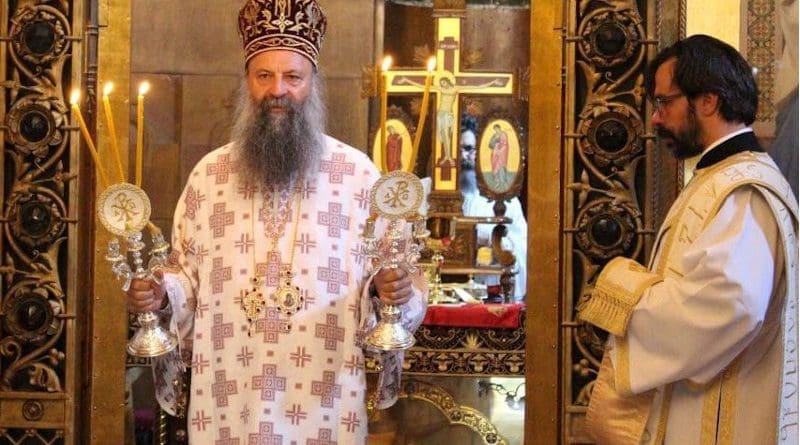Serbian Church Elects Patriarch Deemed Close To President
The influential Serbian Orthodox Church has elected a relatively young new new leader in Porfirije Peric, aged 59 – who in the past has made known his sympathies for Serbia’s government and President.
By Milica Stojanovic
Bishops of Serbia’s powerful Orthodox Church on Thursday elected Porfirije Peric as their 46th patriarch.
The new Archbishop of Pec, Metropolitan of Belgrade and Karlovac and Patriarch of Serbia had previously, since 2014, been Metropolitan of Zagreb and Ljubljana.
From 2010 to 2011, he was the bishop of the Serbian army, and then coordinator for cooperation between the Serbian Orthodox Church and the Serbian army.
Earlier, in 2005, he was elected representative of churches and religious communities in the country’s Broadcasting Agency Council, RRA. The same council elected him as its president in 2008, a position he held until 2014.
Born in Becej, in 1961, he finished elementary school in Curug and high school in Novi Sad, capital of Serbia’s northern Vojvodina province.
In 1986, he graduated from the Orthodox Theological Faculty in Belgrade. Just before that, he was ordained a monk in the famous Decani monastery in Kosovo in 1985. He completed postgraduate studies in Athens, where he remained until 1990. He received his doctorate in 2004 from the theology faculty of the University of Athens.
The Serbian Orthodox Church is by far the largest faith group in Serbia and weilds great influence in public life, especially on such topics like the former province of Kosovo.
In the months following the death of Patriarch Irinej, there was much speculation about of whether the state would try to interfere in the election of a new patriarch.
Porfirije’s election may well satisfy the government, as he is considered close to President Aleksandar Vucic and his regime.
He has on occasion made conservative, pro-government views known. In an article for Serbia’s Tanjug news agency in December 2020, he criticized an article written by the well known anti-war figure Sonja Biserko, complaining of an “orchestrated campaign against the Republic of Serbia, its President and its Government, and almost the entire Serbian people”, which he said could “jeopardize visible progress in establishing mutual understanding and thus return the region to a state of political tension”.
Porfirije also spearheaded the firing of critical professors from the Church’s Faculty of Theology in Belgrade who had spoken out against abuse and corruption in that institution.
The Assembly of Bishops started on Thursday morning with a liturgy in the cathedral-sized St Sava Temple in Belgrade, and the process of voting started at noon.
According to the rules, candidates for patriarch can be any of the bishops with at least five years of diocesan service. A total of 39 members of the Assembly had the right to vote.
The bishops first choose among themselves until they select three candidates. Then, in the second round, the three names are placed in three envelopes in a Gospel. The one pulled out is a matter of luck, or, to believers, the expression of the will of the Holy Spirit
Patriarch Irinej died aged 90 in November 2020 as a consequence of complications related to COVID-19. Early in November he presided over the funeral of Metropolitan Amfilohije Radovic, the Church’s senior bishop in Montenegro, who also died of COVID-related complications. He succumbed soon after.


Serbian Orthodox Church is praying for well being of people and leaders of state wherever it’s located, Serbia, Germany, US or any other country where Serbian people live and attend church. If you have any doubt I invite you to a Sunday mass.
Additionally they are taking care of same flock, one spiritually and the other in this world.